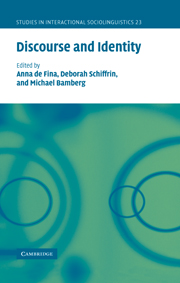Book contents
- Frontmatter
- Contents
- List of contributors
- Introduction
- Part I Overview: theory, method and analysis
- Editors' introduction
- 1 Narrative and identity: the double arrow of time
- 2 Footing, positioning, voice. Are we talking about the same things?
- 3 Small and large identities in narrative (inter)action
- 4 From linguistic reference to social reality
- Part II Private and public identities: constructing who we are
- Part III The gendered self: becoming and being a man
- Part IV The in-between self: negotiating person and place
- References
- index
Editors' introduction
Published online by Cambridge University Press: 09 November 2009
- Frontmatter
- Contents
- List of contributors
- Introduction
- Part I Overview: theory, method and analysis
- Editors' introduction
- 1 Narrative and identity: the double arrow of time
- 2 Footing, positioning, voice. Are we talking about the same things?
- 3 Small and large identities in narrative (inter)action
- 4 From linguistic reference to social reality
- Part II Private and public identities: constructing who we are
- Part III The gendered self: becoming and being a man
- Part IV The in-between self: negotiating person and place
- References
- index
Summary
The chapters in Part I, Overview: theory, method and analysis, present broad (and sometimes challenging) perspectives on several issues pursued and relied upon in many analyses of discourse and identity, including those in the chapters in this volume. Mishler opens Part I by taking sharp and critical aim at the presumption – and privileging – of linear time in the structure of narrative and the formation of identity. Mishler points out that research on narrative and identity is dominated by a “clock/chronological” model of time that has consequences for identity theory. If we assume that a sequence of events provides a causal chain of “what happened,” then the development of identity through narrative should mirror that process: early identities would provide the basic material out of which later identities develop. Mishler argues, however, that our stories do not represent temporal and causal chains leading toward the present. Rather, stories represent more recent (or possibly current) reflections that throw a different light on what happened. Events and plots have actually been selected from many possible configurations at each point in time. Thus the only way we know what events will serve as a beginning or middle of a story is by looking backwards from the end of the story. Likewise, our constructions of identity through narrative flow recurrently between the present and the past.
- Type
- Chapter
- Information
- Discourse and Identity , pp. 27 - 29Publisher: Cambridge University PressPrint publication year: 2006
- 11
- Cited by



